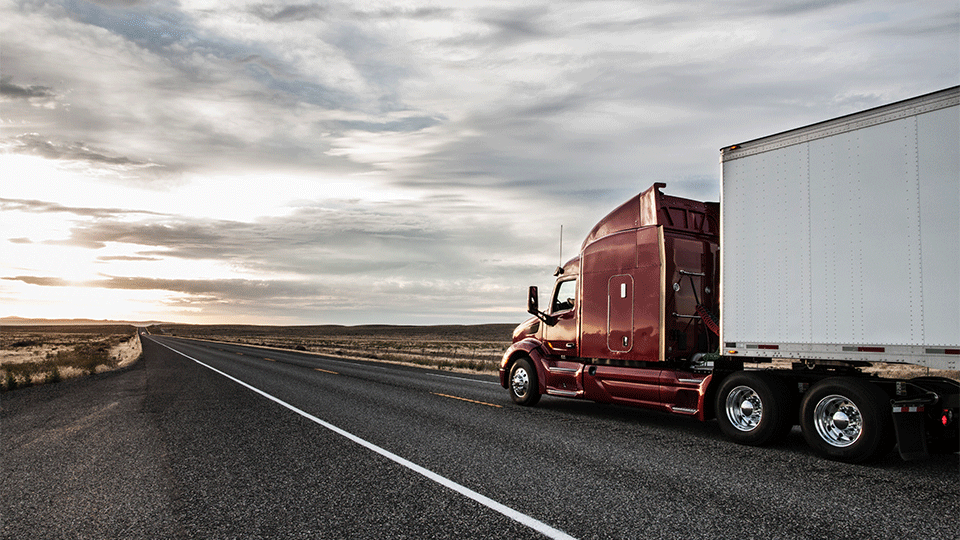
Your freight making it to its destination on time hinges on decisions you made well before it ever loaded. Prime among these decisions is which transportation provider(s) you trust to handle your freight needs.
As a logistics professional, you have a ton of different providers, of all sizes, to choose from. That’s why building out a robust transportation network takes thoughtful planning — a fact you know well.
At the end of the day, your customers are counting on you to come through for them. Could the size of the trucking company you’re working with impact your ability to do so? Perhaps.
You see, although there is a vast array of trucking companies in the U.S., there are pros and cons to working with each of them. Some of these pros and cons are tied to the overall size of the carrier; small companies struggle in ways large ones don’t and vice versa.
Here at Anderson Trucking Service (ATS), we’d probably be considered a mid- to large-sized trucking company — with more than 1,200 trucks and 2,400 trailers. That said, since 1955, we’ve been surrounded by trucking companies of all sizes — from mom-and-pop shops to industry titans. As a result, we’re confident in proclaiming the realities facing trucking companies at all size tiers.
And, in this article, we’ll cover the hidden advantages and disadvantages of working with a “small” trucking company so you can decide where they fit within your network. When creating a transportation network, it’s best to include companies of various sizes.Here’s what you’re getting by working with a small trucking company.
What is Considered a Small Trucking Company?
It’s difficult to definitively state the size at which a trucking company is considered “small.” This threshold — the line between small and medium — doesn’t objectively exist. A company with 1,000 trucks is far smaller than another with 10,000. However, on another scale — like when compared to a 10-truck outfit — a 1,000-truck fleet looms far larger.
As such, a trucking company’s size must be defined loosely — on more subjective terms. However, for the purpose of this article, and your understanding, let’s use the numbers supplied by the Small Business Administration (SBA) which suggests any trucking company with annual revenues of less than $27.5 million is small.
$27.5 million roughly equates to the annual revenues you can expect to garner from 100 trucks. Depending on location and service type, these numbers will change. That said, the pros and cons outlined below apply to trucking companies with 1-100 semi-trucks.
The Pros of Shipping Freight Using a Small Trucking Company
There’s nothing wrong with trusting a small trucking company to handle your freight moves. Some of the most successful businesses use small carriers every day. Like anything else, your transportation network needs balance. This fact isn’t lost on industry titans — which have substantial capacity requirements — and the advantages of working with small companies shouldn’t be ignored.
Here are the major advantages of using a small trucking company to move your cargo:
- Personalized service
- Heightened flexibility in areas of strength
- Competitive pricing in areas of strength
Let’s talk a bit about each of them.
1. Personalized Service
Small trucking companies — especially as they get smaller — tend to use a more personalized approach to customer service. Compared to the larger players, it’s not uncommon for shippers to feel more valued when using a smaller trucking company.
You see, with fewer customers to attend to, expenses to weather and trucks to oversee, small trucking companies can pay greater mind to each individual shipper. Where a larger firm may ask its customer-facing staff to juggle many accounts, smaller outfits don’t have this issue. In turn, this prevents a shipper from feeling like “just a number.”

The value of working with a reliable point of contact that understands your business needs intimately and is never difficult to reach, can’t be overstated. This is the kind of service you can expect from a (good) small trucking company.
2. Heightened Flexibility in Areas of Strength
Although, like their larger counterparts, small trucking companies are primarily concerned with the production of their assets (each truck, trailer and driver), within their areas of strength (where their assets are located), small trucking companies tend to have a bit more flexibility.
This is particularly true if your freight is a good network fit, allowing them to find their next load easily.
Since smaller carriers need to have a robust network of customers within their area of strength, should you need to ship anywhere within these locations, expect them to readily meet these demands.
A prime example of this is a shipment that needs to get to a remote location in Colorado. For a larger carrier, servicing this lane might not make sense. However, for a 15-truck outfit with a history of moving cargo around this area, meeting this demand could be far simpler.
3. Competitive Pricing in Areas of Strength
Profitability is the name of the game for every business — trucking companies included. Every carrier is out to make money, regardless of their size. And, although trucking companies make money in the margin (between their expenses and gross revenue), small trucking companies have a bit more leeway.
Every trucking company has the same fixed expenses. That said, small carriers have fewer overhead considerations than larger ones. This allows these companies to price their services more competitively than the “big guys” within their areas of strength.
So, if you’re a business making price-driven provider-selection decisions, using a small trucking company could save you some money in the right situation.
The Cons of Shipping Freight Using a Small Trucking Company
There are certain situations where using a small trucking company to move your goods is a great idea. We’d venture to say that, in some instances, small carriers will meet your needs better than large ones. That’s why so many titans in the retail, food/beverage and construction industries (to name a few) utilize smaller carriers.
On the other hand, just like any other decision, routing your freight with a smaller company has a few disadvantages to be aware of. In fact, there are definite downsides to choosing a smaller carrier over a large one.
Three main disadvantages of shipping freight using a small trucking company are:
- Small trucking companies have limited resources and coverage
- Smaller carriers can be less financial stability
- Staff may receive less training and development
1. Small Trucking Companies Have Limited Resources and Coverage
At the end of the day, you need a trucking company that can reliably meet your freight needs on a continuous basis. Due to the realities these companies face, smaller carriers might struggle to match this requirement.
You see, comparatively, small trucking companies have far fewer resources than larger carriers, making it harder for them to keep up with technological and equipment advancements as they’re made. Where larger outfits can continually invest in new technologies as they surface and consistently purchase top-of-the-line transportation equipment, small carriers cannot.
As a result, efficiency might be lacking when you work with a small carrier due to truck breakdowns or load-tracking lapses. This is definitely something to be conscious of.
Additionally, by their very nature, small trucking companies can’t match a larger carrier’s coverage levels. Where the largest trucking companies can provide tons of capacity all over the map, small trucking companies can’t. This means they likely won’t be able to handle all of your freight needs the way a bigger company can.
2. Smaller Carriers Can Be Less Financially Stable
The transportation industry is incredibly fragmented; there are hundreds of thousands of transportation companies registered in the U.S.
This is thanks, in part, to transportation’s limited barriers to entry which allow trucking companies to enter the marketplace quite easily. That said, the transportation industry is also highly cyclical; rates rise and fall progressively over time.
As a result, when spot rates fall for an extended period, it’s not unusual for smaller carriers to disappear from the marketplace just as quickly as they arrived. For this reason, it’s crucial that you investigate each small carrier’s financial standing before onboarding them. The last thing you need is to develop a relationship with a carrier that won’t be around in a matter of months.

While small carriers are more vulnerable to financial stability, the best of them take care to remain solvent. Those are the carriers you should work with.
3. Staff May Recieve Less Training and Development
Quality of service is important to every trucking company — big, small or in between. It’s true that you’ll probably receive more personalized service from a well-run small carrier (they typically have more opportunities to get to know your account).
However, with smaller size comes less money which, in turn, equates to fewer training and development opportunities for employees. Seminars, coaching sessions, trade shows and conferences cost money. As does hiring full-time staff to oversee training and development.
And, since paying for employee development is of lesser priority than purchasing insurance, fuel and truck parts, small trucking companies can’t make this investment as readily as large carriers.
For you, this might impact the service quality and expertise you garner from working with a small trucking company. It’s not a deal breaker but having a team of bonafide industry experts in your corner that has been trained in a vast array of transportation services and procedures can benefit you greatly. You may not find this with a small trucking company.
Big or Small, Here’s How To Choose a Carrier
Having a variety of trucking companies — of all sizes — in your corner is very beneficial. This will give you the flexibility to choose the best one for every shipment and peace of mind in knowing that, when it’s time for the rubber to meet the road, you have a competent asset-based provider to back you up.
Many companies, across industries, find benefits in shipping loads using small carriers (defined here as companies with 100 or fewer trucks). That said, there are several pros and cons of shipping freight with them, including:
Pros:
- Personalized service
- Great flexibility
- Competitive pricing
Cons:
- Limited resources and coverage
- Less financial stability
- Less training and development for staff
Keep these pros and cons in mind in the future as you build out your transportation network.
At the end of the day, regardless of their size, you need reliable carriers. However, with so many trucking companies to choose from, it can be hard to select the best ones from the field. To help you do so, we’ve developed this 30-question Freight Carrier Selection Checklist. Download it for free today and use it during your vetting conversations to ensure every carrier you use has the infrastructure and history to meet your needs.
Finally, if you would like to learn more about ATS’ service offerings and the things our teams do to deliver for more than 5,000 customers, contact us here. One of our transportation experts will get back to you expeditiously.




